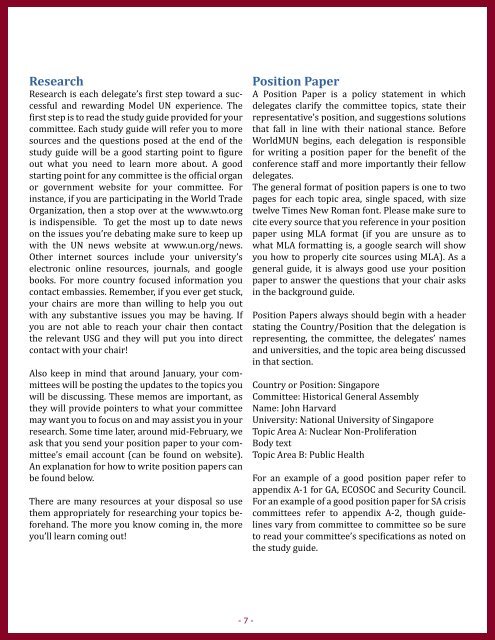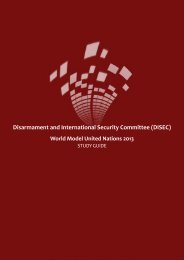here - World Model United Nations
here - World Model United Nations
here - World Model United Nations
Create successful ePaper yourself
Turn your PDF publications into a flip-book with our unique Google optimized e-Paper software.
Research<br />
Research is each delegate’s first step toward a successful<br />
and rewarding <strong>Model</strong> UN experience. The<br />
first step is to read the study guide provided for your<br />
committee. Each study guide will refer you to more<br />
sources and the questions posed at the end of the<br />
study guide will be a good starting point to figure<br />
out what you need to learn more about. A good<br />
starting point for any committee is the official organ<br />
or government website for your committee. For<br />
instance, if you are participating in the <strong>World</strong> Trade<br />
Organization, then a stop over at the www.wto.org<br />
is indispensible. To get the most up to date news<br />
on the issues you’re debating make sure to keep up<br />
with the UN news website at www.un.org/news.<br />
Other internet sources include your university’s<br />
electronic online resources, journals, and google<br />
books. For more country focused information you<br />
contact embassies. Remember, if you ever get stuck,<br />
your chairs are more than willing to help you out<br />
with any substantive issues you may be having. If<br />
you are not able to reach your chair then contact<br />
the relevant USG and they will put you into direct<br />
contact with your chair!<br />
Also keep in mind that around January, your committees<br />
will be posting the updates to the topics you<br />
will be discussing. These memos are important, as<br />
they will provide pointers to what your committee<br />
may want you to focus on and may assist you in your<br />
research. Some time later, around mid-February, we<br />
ask that you send your position paper to your committee’s<br />
email account (can be found on website).<br />
An explanation for how to write position papers can<br />
be found below.<br />
T<strong>here</strong> are many resources at your disposal so use<br />
them appropriately for researching your topics beforehand.<br />
The more you know coming in, the more<br />
you’ll learn coming out!<br />
- 7 -<br />
Position Paper<br />
A Position Paper is a policy statement in which<br />
delegates clarify the committee topics, state their<br />
representative’s position, and suggestions solutions<br />
that fall in line with their national stance. Before<br />
<strong>World</strong>MUN begins, each delegation is responsible<br />
for writing a position paper for the benefit of the<br />
conference staff and more importantly their fellow<br />
delegates.<br />
The general format of position papers is one to two<br />
pages for each topic area, single spaced, with size<br />
twelve Times New Roman font. Please make sure to<br />
cite every source that you reference in your position<br />
paper using MLA format (if you are unsure as to<br />
what MLA formatting is, a google search will show<br />
you how to properly cite sources using MLA). As a<br />
general guide, it is always good use your position<br />
paper to answer the questions that your chair asks<br />
in the background guide.<br />
Position Papers always should begin with a header<br />
stating the Country/Position that the delegation is<br />
representing, the committee, the delegates’ names<br />
and universities, and the topic area being discussed<br />
in that section.<br />
Country or Position: Singapore<br />
Committee: Historical General Assembly<br />
Name: John Harvard<br />
University: National University of Singapore<br />
Topic Area A: Nuclear Non-Proliferation<br />
Body text<br />
Topic Area B: Public Health<br />
For an example of a good position paper refer to<br />
appendix A-1 for GA, ECOSOC and Security Council.<br />
For an example of a good position paper for SA crisis<br />
committees refer to appendix A-2, though guidelines<br />
vary from committee to committee so be sure<br />
to read your committee’s specifications as noted on<br />
the study guide.
















